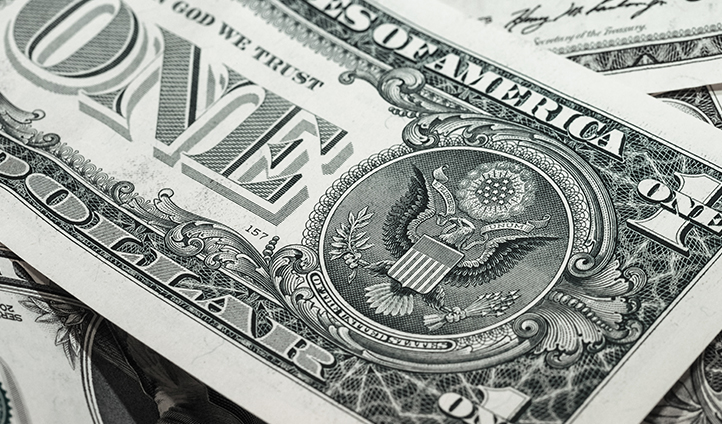Supreme Court Declares Greenbacks Legal in Knox v Lee
Historical
In Knox v Lee, 79 U.S. 457 (1871), the U.S. Supreme Court held that the Legal Tender Act, which authorized the printing of paper money not redeemable in gold or silver, did not violate the U.S. Constitution. In so ruling, the Court reversed its earlier decision in Hepburn v. Griswold.
Legal Tender Lawsuits
Under Article 1, Section 10 of the U.S. Constitution, no state shall “emit bills of credit and “make anything but gold and silver coin a tender in payment of debts.” The Constitution does not place similar restrictions on the federal government.
During the Civil War, the U.S. Treasury Department suspended payment in gold and silver. Congress subsequently enacted the Legal Tender Act of 1862, which authorized the Treasury to issue paper money (commonly referred to as “greenbacks”) to finance the war. Salmon P. Chase was the Secretary of the Treasury at the time. Two years later. President Lincoln nominated him to serve as Chief Justice of the Supreme Court of the United States.
In Hepburn v. Griswold, the Supreme Court first considered the constitutionality of the Legal Tender Act. By a vote of 5-3, the justices held that that the federal government did not have the power to issue paper money. It also held forcing citizens to accept greenbacks for pre-existing debts incurred in gold or silver violated the Constitution’s contracts clause.
When the Court was asked to again address the constitutionality of the Legal Tender Act one year later, two new justices — Joseph Bradley and William Strong — had joined the Court. They were instrumental in the Court’s reversal of Hepburn.
Facts of Knox v Lee
After her sheep were confiscated and sold by the Confederate Army, Mrs. Lee filed suit against the purchaser, Mr. Knox, for damages. In the trial that followed, the court instructed the jury as follows: “In assessing damages, the jury will recollect that whatever amount they may give by their verdict can be discharged by the payment of such amount in legal tender notes of the United States.” Mr. Knox appealed, arguing that instruction essentially directed the jury to account for the discounted value of paper currency when awarding damages.
Court Uphold Legal Tender Act in Knox v Lee
By a vote of 5-4, the Court upheld the Legal Tender Act. “The acts of Congress known as the Legal Tender are constitutional, when applied to contracts made before their passage. They are also valid as applicable to contracts made since,” Justice William Strong wrote on behalf of the majority.
In his opinion, Justice Strong highlighted that Congress wields significant power under the “necessary and proper” clause of the Constitution. He wrote:
And here, it is to be observed, it is not indispensable to the existence of any power claimed for the federal government that it can be found specified in the words of the Constitution, or clearly and directly traceable to someone of the specified powers. Its existence may be deduced fairly from more than one of the substantive powers expressly defined, or from them all combined. It is allowable to group together any number of them and infer from them all that the power claimed has been conferred. Such a treatment of the Constitution is recognized by its own provisions.
Justice Strong further emphasized that Congress authorized the printing of paper money during wartime, as a way to meet “legitimate and necessary ends.” He wrote:
It was at such a time and in such circumstances that Congress was called upon to devise means for maintaining the army and navy, for securing the large supplies of money needed, and, indeed, for the preservation of the government created by the Constitution. It was at such a time and in such an emergency that the legal tender acts were passed.
The majority also rejected the argument that the Legal Tender Act was forbidden by the letter or spirit of the Constitution because Congress is only expressly given the power “to coin money, regulate the value thereof, and of foreign coin.” As explained by Justice Strong, the fact that Congress was given certain powers over the currency does not imply that all other powers relating to the same subject are impliedly forbidden. “[S}uch is not the manner in which the Constitution has always been construed. On the contrary it has been ruled that power over a particular subject may be exercised as auxiliary to an express power, though there is another express power relating to the same subject, less comprehensive,” he added.
Previous Articles
SCOTUS Rules State Can’t Immunize Parties from Federal Civil Liability
by DONALD SCARINCI on January 29, 2026
In John Doe v. Dynamic Physical Therapy, LLC, 607 U.S. ____ (2025) the U.S. Supreme Court held that...
Supreme Court to Address Racial Discrimination in Jury Selection
by DONALD SCARINCI onWhile the U.S. Supreme Court has concluded oral arguments for the year, it continues to add cases t...
Supreme Court Halts Deployment of National Guard to Chicago
by DONALD SCARINCI on
In Trump v. Illinois, 607 U.S. ____ (2025), the U.S. Supreme Court refused to stay a district court...
The Amendments
-
Amendment1
- Establishment ClauseFree Exercise Clause
- Freedom of Speech
- Freedoms of Press
- Freedom of Assembly, and Petitition
-
Amendment2
- The Right to Bear Arms
-
Amendment4
- Unreasonable Searches and Seizures
-
Amendment5
- Due Process
- Eminent Domain
- Rights of Criminal Defendants
Preamble to the Bill of Rights
Congress of the United States begun and held at the City of New-York, on Wednesday the fourth of March, one thousand seven hundred and eighty nine.
THE Conventions of a number of the States, having at the time of their adopting the Constitution, expressed a desire, in order to prevent misconstruction or abuse of its powers, that further declaratory and restrictive clauses should be added: And as extending the ground of public confidence in the Government, will best ensure the beneficent ends of its institution.





